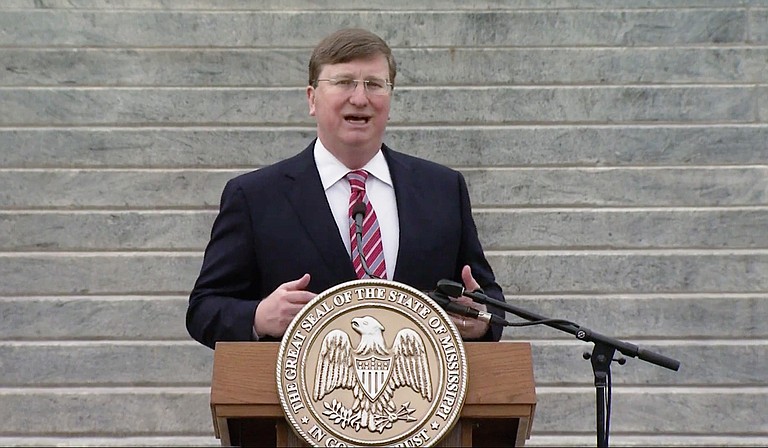In his “State of the State” address, Gov. Tate Reeves extolled Missippian’s industriousness and perseverance while proposing to abolish state income tax. Photo courtesy State of Mississippi
Wednesday, January 27, 2021
“Our state is unconquerable,” Gov. Tate Reeves’ 2021 State of the State address began. Reeves congratulated Mississippians on their resilience and camaraderie in weathering COVID-19 in the past year. “We have taken every hit that can be thrown,” he said.
While the state has suffered almost 270,000 cases of COVID-19 and nearly 6,000 related deaths since the pandemic has consistently spread, Reeves praised the people of Mississippi for continuing to look for work and go about their lives.
“Life cannot be lived in perpetual idleness in isolation,” he said.
The governor celebrated the economy as well, applauding how certain sectors remained open even during the worst of the pandemic. “We never shut down farms,and we never shut down factories, Reeves said.
“While we did slow down, we opened up as quickly and widely as we possibly could,” he added.
True enough, Reeves kept the state open longer than many others, only relenting to a shelter-in-place order after pressure from health-care leadership across the state, most notably the University of Mississippi Medical’s Center’s Dr. LouAnn Woodward.
Looking to the future, Reeves proposed the eventual abolition of the state income tax in order to attract outside investment and promote job growth. “It is a reward for our hard workers and an incentive for others to invest here, to grow here and, yes, an incentive for them to live here,“ he said.
The income-tax phase-out would take place over the next decade, Reeves proposed. As detractors have noted, ending the state’s income tax would disproportionately benefit the wealthiest Mississippians, leaving low-earners receiving few benefits from the move.
Additionally, it has several high-profile skeptics, including Lt. Gov. Delbert Hosemann, who told the Jackson Free Press late last year that he would not support an end to the tax without a concrete plan to replace the nearly $2 billion in lost revenue it would entail.
“Until we have a solution … it’s not ‘Field of Dreams.’ I don’t print money. We have to have enough funds to pay for highway patrol, education, all the other things we pay for as a state,” Hosemann said.
Gov. Reeves said nothing of alternative proposals to cut the state’s sales tax—one far more significant to the daily lives of poorer Mississippians.
Reeves did mention additional economic measures such as a pay raise for teachers, as well as job-training programs for young Mississippians. “We don't need Mississippians to be stuck in low-paying jobs. We want them to embark on careers with good pay and freedom,” the governor said.
The address ended with cautious optimism, with Reeves noting that the pandemic must be dealt with before focusing on long-term economic endeavors. “The virus is still here, and it cannot be solved by ignoring it,” he said.
“This is our moment,” Reeves said. “We can see the light at the end of the tunnel, and Mississippi is sprinting towards it.”
Email Reporting Fellow Julian Mills at [email protected].

Comments
Use the comment form below to begin a discussion about this content.
Sign in to comment
Or login with:
OpenID